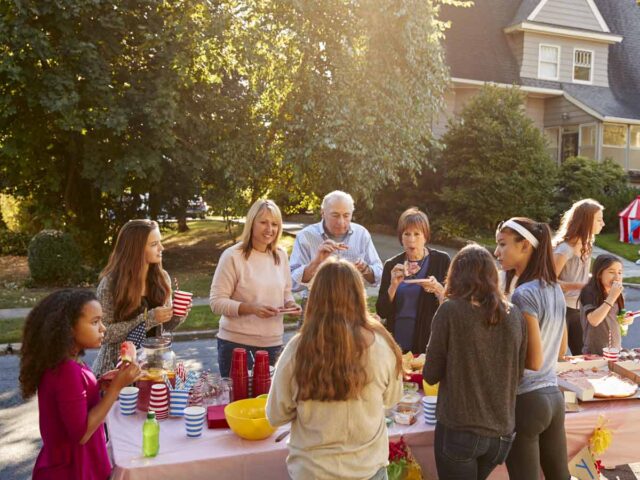
Living harmoniously with your neighbours requires more than simply waving at them across the street or holding the door open as you pass by. Building a sense of community, showing respect to everyone, and creating a welcoming atmosphere are the most important aspects of good neighbourhood etiquette.
Understanding Neighbourhood Etiquette
Neighbourhood etiquette is a shared understanding of mutual respect and consideration among neighbours. It’s recognising that we are surrounded by people, and what we do will inevitably have an effect on them. This can range from keeping noise levels down during certain hours, maintaining the cleanliness of common areas, to something as specific as obeying parking regulations.
A Considerate Homeowner and Neighbour

Being a considerate homeowner and neighbour involves a variety of behaviours. Firstly, maintaining your property shows respect for your surroundings and pride in your community. Be sure to keep your home, garden, and outside spaces tidy and well-maintained.
Noise control is another important aspect of neighbourly etiquette. Being mindful of the timing and volume of noise you make is important, even though some level of noise is expected in a residential area. Avoid playing loud music or using noisy equipment early in the morning or late at night and be conscious of your neighbours who may be working from home, studying, or have young children.
Pets can bring joy and companionship to our lives, but they can also cause friction between neighbours if not managed correctly. Taking measures to ensure your furry friend is well-mannered, promptly tidying up any messes they make, and minimising excessive noise levels can greatly contribute to cultivating positive relationships with your neighbours.
In addition, being a considerate neighbour means respecting boundaries. This means not encroaching on your neighbour’s property or privacy and understanding that your freedom ends where there’s begins.
The Role of Residents-Only Parking Signs
Finding a place to park can often be a source of conflict when it comes to trying to maintain a peaceful community. This is where residents-only parking signs come into play.
Residents-only parking signs are implemented to prioritise the parking needs of the people who live in a particular neighbourhood. These signs guarantee that homeowners and renters can park near their dwellings, which is especially important in overpopulated regions where parking is usually scarce.
Respecting these regulations is an essential part of being a considerate neighbour. Ignoring these signs not only inconveniences your neighbours but may also lead to fines or other penalties. Remember, these rules are in place to promote fairness and ease of parking for everyone within the community.
Additionally, you should make sure your visitors are aware of the parking rules. Most communities have provisions for guest parking, and understanding these rules can help avoid unnecessary conflicts.
Parking Etiquette and Considerations

When you park your vehicle, take care that you don’t block someone’s entrance or cause any issues for other motorists. If you own multiple vehicles, keep them in the driveway or garage to make space on the street for other drivers.
In addition, be mindful of people with special needs in your neighbourhood. If you notice a neighbour with mobility issues or a family with young children, it might be kind to leave the spot closest to their home open for them. Even little actions like these can go a long way in creating a sense of community and goodwill.
Communication: Key to a Harmonious Neighbourhood
Open and respectful communication can resolve many potential issues before they escalate. If you’re planning a renovation that might cause noise, inform your neighbours in advance.
If you’re planning to have a party, inform them and make sure they know that you’ll try to keep noise levels to a minimum. If you have any issues, such as a tree branch from their yard encroaching on your property, approach them politely and discuss a solution.
Similarly, if your neighbour approaches you with a concern, listen attentively, and address their issues respectfully. Remember, everyone appreciates being heard and respected.
The Role of Community Involvement

A strong sense of community can enhance neighbourly relations. Get involved in your neighbourhood, be it a neighbourhood watch program, a local festival, or a community clean-up. Being involved gives you a chance to get to know your neighbours beyond a wave or a casual hello. You can gain knowledge of their lifestyles and needs, and hopefully create a bond of collaboration and respect.
Moreover, active involvement in your community can provide an opportunity to discuss and shape neighbourhood policies, including parking regulations. This way, everyone has a say, and the rules reflect the needs and considerations of the community members.
Neighbourhood Disputes: Handling with Care
Despite everyone’s best efforts, disputes can arise. It’s important to handle these situations with patience and diplomacy. Avoid escalating the situation or resorting to hostile behaviours. Instead, aim for a peaceful resolution that maintains the relationship and keeps the neighbourhood atmosphere positive.
If the dispute revolves around a violation of community rules, such as ignoring residents-only parking signs, remind your neighbour about the regulations. If they have just moved to the area, they may not be aware of the rules. If the problem persists, consider involving your homeowners’ association or local council in the matter.

Conclusion
Being a considerate homeowner and neighbour is a continuous effort that requires understanding, patience, and empathy.
By respecting the shared space, maintaining open lines of communication, getting involved in the community, and upholding rules like the residents-only parking, we can all contribute to creating a harmonious neighbourhood. It is important to remember to treat others as we would want to be treated – with respect, consideration, and kindness.













